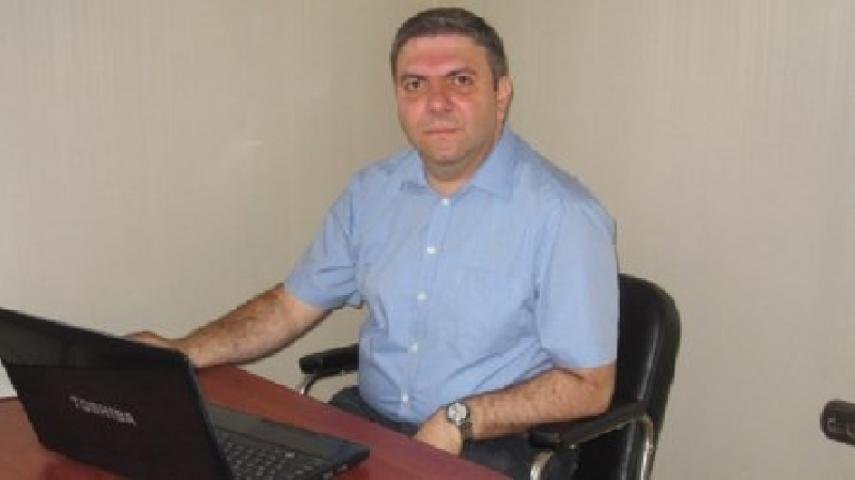NON-GOVERNMENTAL ORGANIZATION
By Torturing People to Reveal Crimes the Police Commit a Bigger Crime: Arman Danielyan

Interview with Arman Danielyan, member of the UN Subcommittee on Prevention of Torture, President of Civil Society Institute NGO.
Despite absolute constitutional ban, tortures against people continue, and usually by the officials whose responsibility is to defend human rights. Please, present the situation in Armenia in brief. Who commits torture, where and in what way?
Torture is more widespread in the RA police system with their main objective being extortion of self-confessing testimony. Recent years have seen cases when brutal methods were used even against witnesses, and it raises serious concerns.
One of the first reasons of torture is that the majority of our policemen have no appropriate professional training. They cannot reveal cases using the Sherlock Holmes methods - by thinking, collecting facts and analyzing them. The most widespread method they use is to find out somehow that someone committed a crime or suspect someone in committing a crime, then torture him to make him confess and send the case with self-confession to the court. This method of working is supported also by the assessment of the policemen's work based on statistics - the number of revealed cases. In such circumstances the Sherlock Holms type policemen are excelled by those favoring "immoral" methods, since if a lot of time is needed to find the real criminal by using the brains, extorting self-confessing testimony by torturing people takes lesser time. In many cases they extort self-confessions even from innocent people and guarantee a high per cent of crime revealing which affects their further professional promotion.
Policemen commit a bigger crime by torturing people to reveal crimes.
Do you have any statistical data concerning torture?
It is generally impossible to find statistical data in Armenia. Besides the fact that most cases do not become known, in case if they become known, no appropriate investigation is conducted: there is a problem with a not precise definition of "torture" in the Criminal Code. The term "torture" defined in the RA Criminal Code does not correspond to the description of the torture defined by the UN Convention against Torture. If someone torments another person, our legislation considers it torture, which does not correspond to the essence of torture. In reality torture is an action committed by an official or with his knowledge that inflicts physical or psychological pain to the person to extort testimony or data from him.
In Armenia policemen are convicted not for the corpus delicti of torture but by article 375 of the Criminal Code - abuse of authority or administrative dereliction, or article 309 - abuse of official powers as it was in the Vahan Khalafyan's case. As a result, it is difficult even to count the number of revealed and punished torturers.
You together with representatives of other NGOs have many times voiced the problem of overcrowded Armenian penitentiaries. Can it be considered torture and how should the issue of overcrowded prisons be solved?
It is not torture but it can be considered cruel, inhuman or degrading attitude defined by the UN Convention against Torture and Other Cruel, Inhuman or Degrading Treatment or Punishment.
In what countries does torture occur more often?
Generally the practice of torture is closely connected with the historical past of the given country. For instance, the Stalin period has left its strong traces in our region and what the then prosecutor general Vishinsky said - "Self-confession is the queen of evidence", still works here. That is, if a man makes a confession, no other proofs are needed, only that is enough to convict the person. This principle works almost in all post soviet states until now.
It is worth mentioning that, for instance, the Baltic states, which were not part of the Soviet Union in the 1930s, very easily declined the practice of torture and one can say that there is almost no torture in their police system.
What has to be done in Armenia to make the fight against torture more efficient?
Unfortunately, torture is a phenomenon you cannot get rid of in one day; to do that you have to start from the basis.
First, we need to educate the policemen. It is a very big work and I don't think that most of today's policeman can be re-qualified. The police academy has to completely reform its teaching methods.
The second problem is focusing the attention of judicial system to reports about torture so that in case of any doubt serious investigation is conducted to find out if the testimony was given due to torture or not. The same concerns prosecutor's office. At present even if the person claims in the court that he has given self-confessing testimony because of torture and changes his testimony, the court takes into consideration his old self-confessing testimony and does not accept the new testimony.
There are cases when the court takes into account claims about torture but the prosecutor's office does not investigate those cases seriously enough.
The civil society too has to do a lot in this question and should have an active controlling function. Transparency of the system is one of the main methods of preventing torture, i.e. the policeman has to know that someone can open his door at any moment, enter his office and see what is going on there.
How transparent is our police system?
It is absolutely not transparent. It is one of our main problems. When the Group of public observers conducting monitoring of penitentiary institutions of the police was established, they were allowed to visit only the places where the convicts were kept, their cells, whereas access to the offices where the torture is conducted is denied until today.
We hope that when the national prevention mechanism based on the UN Torture convention starts working adequately, it will be possible to settle that shortcoming.
Interview by Mary Alexanyan
Source - www.hra.am

